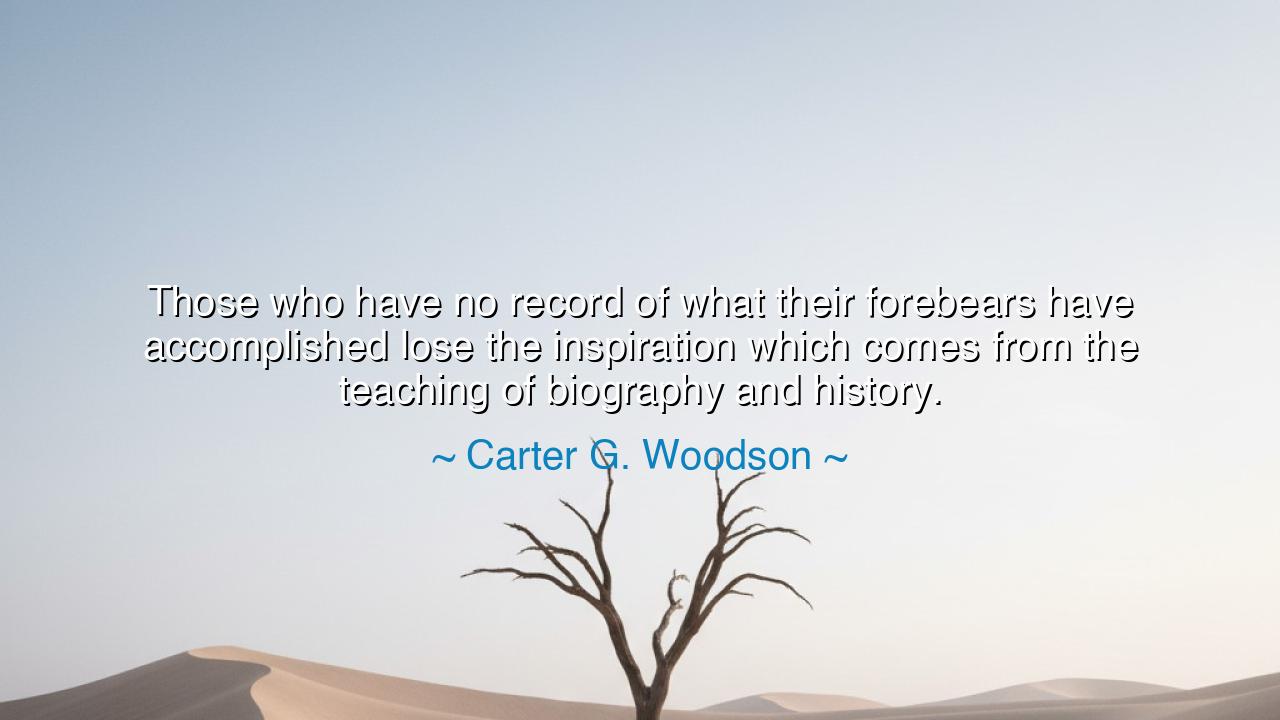
Those who have no record of what their forebears have
Those who have no record of what their forebears have accomplished lose the inspiration which comes from the teaching of biography and history.






“Those who have no record of what their forebears have accomplished lose the inspiration which comes from the teaching of biography and history.” – Carter G. Woodson
These are the words of Carter G. Woodson, the great historian, scholar, and founder of Black History Month, a man who understood that knowledge of one’s past is not a luxury but a lifeline. In this profound declaration, he speaks not only to his own people, whose stories were too often silenced, but to all humanity. For he saw that history is the mirror of identity — that without remembrance, a people wanders in confusion, and without record, the spirit grows faint. Woodson’s words are both a warning and a call to arms: that to forget what our ancestors have done is to cut the roots that nourish our strength.
In his time, Woodson witnessed the tragedy of a generation taught to despise its own origins. He saw the children of the African diaspora learning of European kings but not of African empires, hearing of invention and genius yet never told that their own forebears had contributed to the world’s wisdom. His mission was born of fire — to record what others had erased, to teach what others had ignored. He believed that to study biography and history was not merely to learn facts but to awaken pride, resilience, and purpose. The study of history, to Woodson, was not about the past — it was about empowering the present.
When he founded the Association for the Study of Negro Life and History in 1915, Woodson sought to restore a people’s inheritance. From this effort would arise Negro History Week, which later became Black History Month — a time to honor kings and queens of forgotten lands, inventors and scholars whose names had been buried, fighters for freedom whose stories had been denied. Through this work, he proved the truth of his own quote: that when people are shown what their ancestors have accomplished, they rise from despair to dignity. For how can one believe in one’s potential when one has been told that one has no past?
History teaches us this lesson again and again. Consider the tale of Mansa Musa, emperor of Mali in the fourteenth century, whose empire flourished with wealth, learning, and faith. For centuries, his story was hidden from the world, while tales of Europe’s wealth were exalted. Yet when modern historians uncovered his legacy, he became a symbol of what African civilization had achieved long before colonial chains. His rediscovery did more than correct a record — it restored pride to generations who had been told that greatness was foreign to their blood. Woodson understood this power: that to record the truth is to restore the soul.
But his message extends beyond race or nation. Every people, every family, every community has its forebears — men and women who fought, built, dreamed, and suffered so that others might live more freely. To lose sight of them is to lose the wisdom they paid dearly to gain. The young who ignore their ancestors are like trees that forget their roots: they may grow swiftly, but they will fall with the first storm. Yet those who keep the record — who remember — are unshakable. For they carry within them not just their own strength, but the strength of all who came before.
Woodson’s words speak powerfully to the age we live in now — an age of information yet also of forgetting. We scroll endlessly through the present, but seldom pause to look backward. We must resist this amnesia of convenience. We must read the biographies of those who changed the world; we must record the stories of our elders before they fade; we must keep alive the flame of memory, for it lights the path ahead.
So, my child of the future, take this wisdom to heart: cherish your history, study your heroes, and keep a record of their deeds. Do not let their names vanish from your tongue or their lessons slip from your heart. When you know what your forebears have accomplished, you inherit their courage; you walk not alone, but among giants. Let the teaching of biography and history be your wellspring of hope, your compass of purpose. For a people who remember are a people who rise — and those who rise with remembrance can never again be made to bow.






AAdministratorAdministrator
Welcome, honored guests. Please leave a comment, we will respond soon